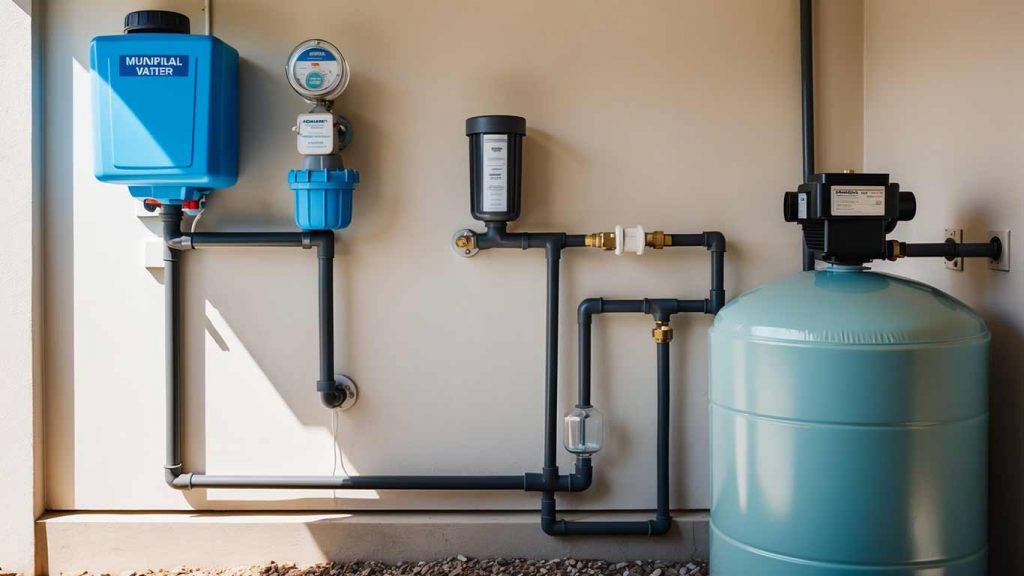Does Water Work When Power Is Out in Lawrenceville GA?
Most of us instinctively reach for flashlights when the lights go out or wonder about our devices’ battery life. But another vital question often arises: Will the water keep running?
The answer isn’t simple, as your access to water during a power outage depends on a range of factors, including the type of water system in your area and even the layout of your home.
In this blog post, professional plumbers from Gwinnett Plumber Pro will explain what to expect from your water system during a power outage in Lawrenceville, GA.
Which Plumbing Systems and Appliances Won’t Work When Power Is Out
- Well water pumps
- Electric water heaters
- Booster pumps in high-rise buildings
- Sump pumps
- Water softeners with electric controls
- Tankless water heaters (require electric ignition)
- Electric-powered sewage ejector pumps
- Pressure booster systems for low-water-pressure areas

Stay prepared for power outages with insights from Gwinnett Plumber Pro. Learn how different water systems handle outages and how to maintain access in Lawrenceville, GA.
Which Plumbing Systems Are Not Affected by Power Outage
- Gravity-fed municipal water systems
- Gravity-fed water tanks in certain homes and buildings
- Gas-powered water heaters (with manual ignition)
- Gravity-fed toilets in municipal water systems
- Non-electric plumbing fixtures (manual faucets and valves)
How Power Outages Affect Different Water Systems in Lawrenceville GA?
Municipal or City Water Systems
Most residents in Lawrenceville rely on a city water system, which is generally resilient to power outages. Municipal water systems serve entire communities and often have measures to keep water flowing during short-term power outages, such as:
- Backup Power Sources: Municipal systems often have backup generators to power essential parts of the water supply infrastructure, ensuring that pumps and treatment facilities continue operating without regular electricity. This means that, in many cases, your tap will still run during a power outage, at least for a short while.
- Water Pressure Stability: Depending on the length of the outage, you may notice a gradual drop in water pressure, especially if the backup generators are not designed for extended outages. Over time, as storage tanks deplete, pressure can reduce further, potentially affecting water flow in your home.
If your home relies on a municipal water supply, we recommend keeping a few gallons of stored water at home, especially if you anticipate a long-term outage.
Well Water Systems
Private well water systems in and around Lawrenceville, GA, rely on electric pumps to draw water from underground sources and supply it to your home. These pumps can’t operate without power, so your water access is directly affected during an outage.
- Immediate Water Loss: When the power goes out, you’ll likely lose access to running water almost immediately, as there’s no pressure to bring water to the faucets.
- Backup Options: Some well owners install backup generators or battery systems to power the pump and maintain water access during outages. This setup ensures that, even without regular electricity, your well pump can continue working temporarily.
- Pressure Tanks and Limited Access: If your well system has a pressure tank, you may be able to access a small amount of water until the tank empties. However, this is only a short-term solution, as once the tank is depleted, you’ll need electricity to refill it.
Storing water for drinking, cooking, and hygiene is essential for homes with well water systems. You can also invest in a generator specifically for the pump or maintain a reserve of water for emergencies.
Apartment Complexes and High-Rise Buildings
In apartment complexes or high-rise buildings, water systems often use electric water pumps to transport water to higher floors. The extent of water access during an outage varies depending on the building’s infrastructure and backup systems.
- Lower Floors vs. Higher Floors: Residents on lower floors may experience less disruption as gravity-fed systems can sometimes keep water flowing. However, those on higher floors are more likely to see immediate water loss because pumps are essential to move water vertically.
- Building Backup Power: Some complexes and high-rise buildings have backup generators, including water pumps, to keep essential services running. If your building has a generator, you may have water access, albeit possibly at reduced pressure.
Apartment dwellers, especially those on higher floors, should keep a few drinking water bottles on hand if they anticipate frequent power outages.
Gravity-Fed and Elevated Water Tank Systems
In certain cases, water systems might rely on elevated tanks that use gravity to supply water. Water from an elevated tank flows downward to provide pressure, keeping taps running for some time. However, without power, these tanks will not refill, which limits how long water will be available.
Gravity-fed systems will lose pressure once the stored water depletes, and water access will cease until power is restored.
Staying Prepared for Water Access During Power Outages in Lawrenceville, GA
When the power goes out in Lawrenceville, your water access depends on the type of water system your home or building relies on. While municipal systems are typically better equipped to handle short outages, well water and high-rise setups may see immediate interruptions. Understanding how each system responds and taking simple steps, like storing drinking water, investing in a generator for well systems, or checking your building’s backup plans, can help you be prepared for any outage.
FAQs About Water Supply During Power Outages
How long can I expect water to flow after the power goes out?
The duration of water flow during a power outage depends on your water system. Municipal systems may provide water for a short time, while well systems stop almost immediately unless there’s a backup generator. Gravity-fed systems may also provide temporary water flow until their storage tanks deplete.
Can I flush toilets during a power outage?
Yes, toilets can usually be flushed during a power outage, especially if you’re on a municipal water system with gravity-fed plumbing. For well water users, a single flush may work if there’s residual pressure, but you’ll need to add water manually.
Are there other water sources I can use?
If your regular water supply is cut off, you can use stored emergency water, water from water heaters, or even melted ice for essentials. It is wise to keep extra water bottles or gallons on hand for emergencies.
How can I prepare my home for water outages?
To prepare for water outages, store several gallons of drinking water, keep a few buckets for flushing toilets, and consider investing in a generator if you rely on a well. Bottled water and a water purification kit can also be helpful in extended outages.

